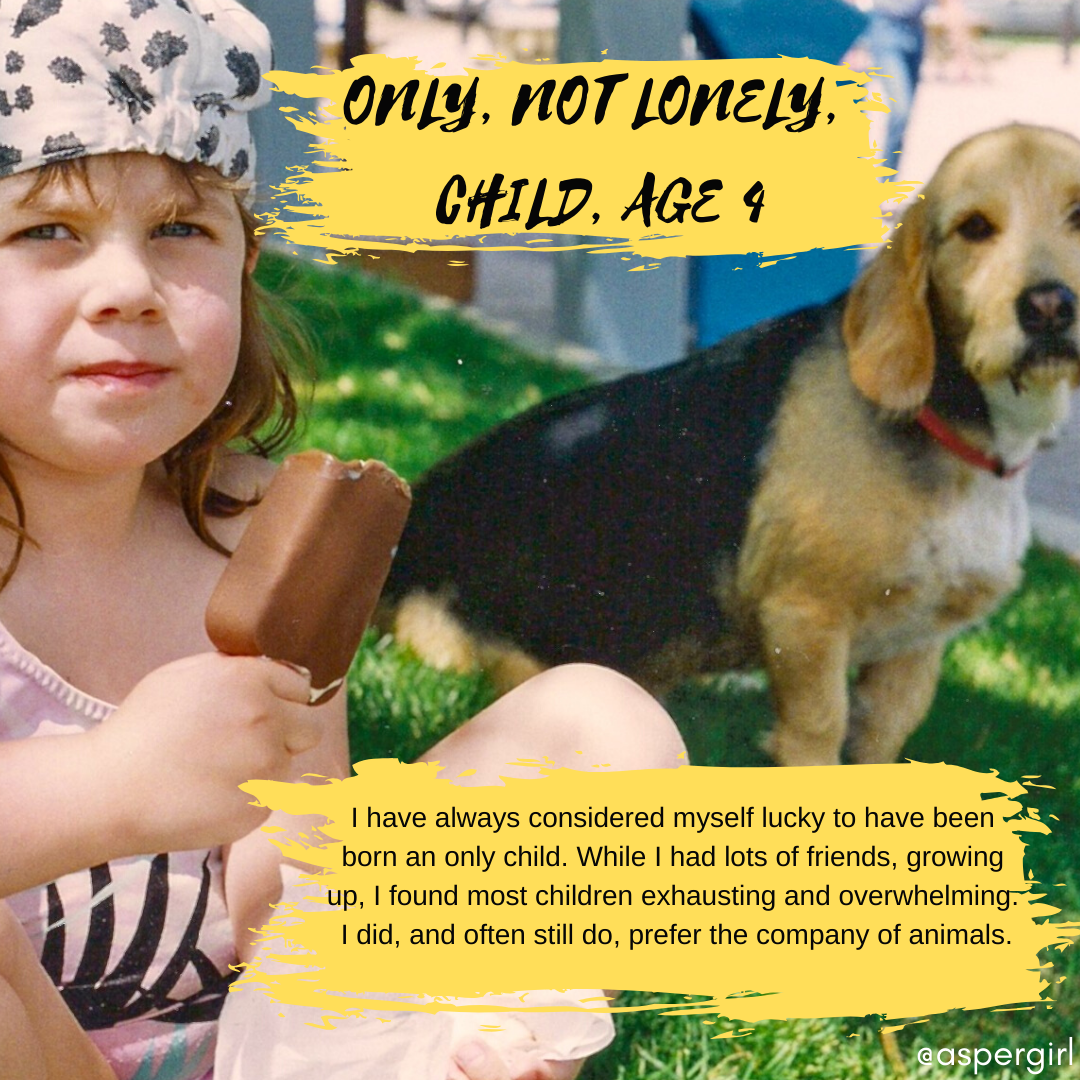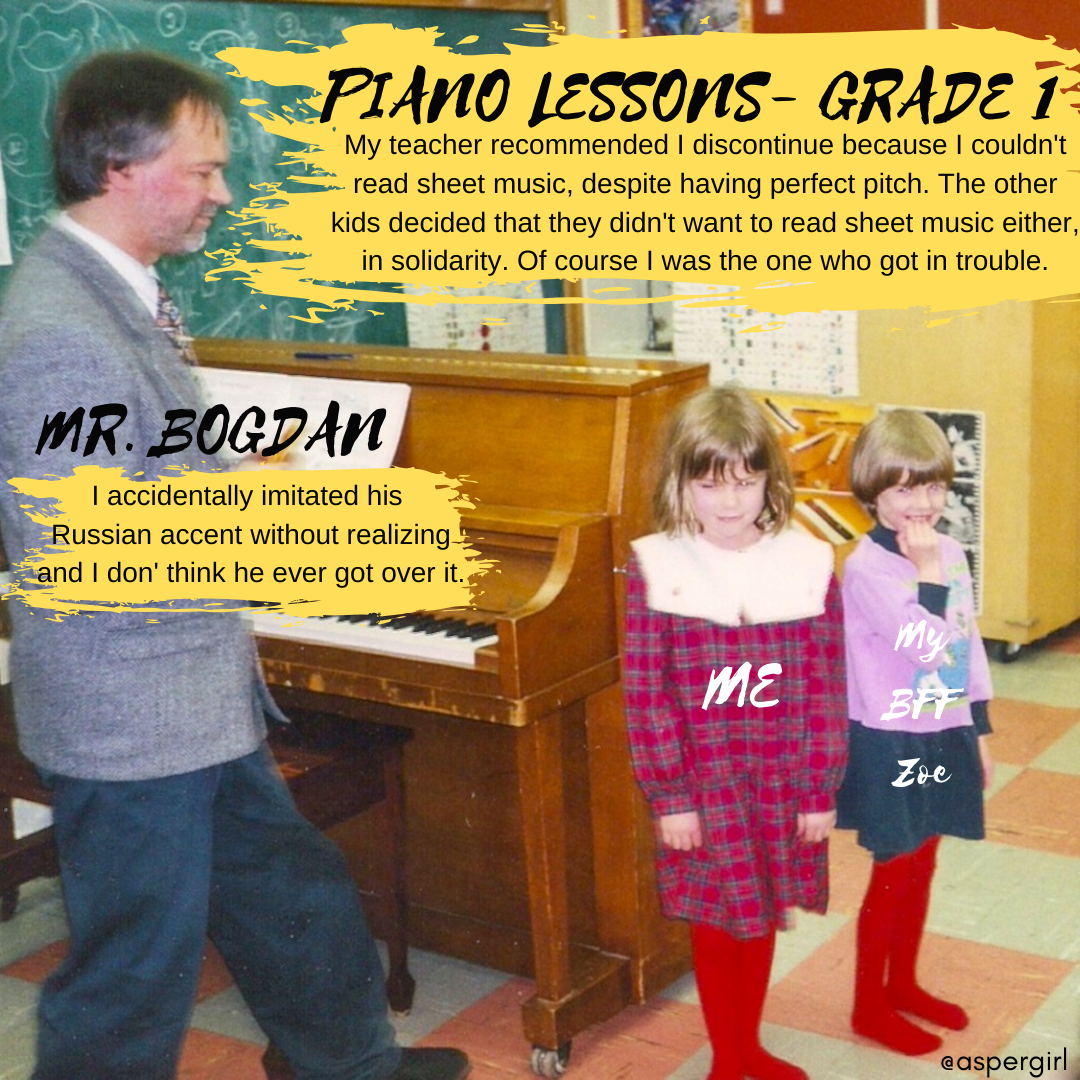5 Facts About Autism I Wish I Had Known Growing Up
What you wouldn’t have read in the textbook under “Autism”
Yes, on paper I had an above average childhood that left me with a decent-enough resume to carry me through adulthood. My untraditional parents were affectionate and supportive of anything I wanted to try, from gymnastics to violin, circus school to tap dancing. I grew up in downtown Toronto where diversity and open-mindedness appeared to be the norm.
My hippie mother sent me to an alternative school where we spent Physics class sledding at the park, timing our free-falls in relation to the slope of the hills, warming up by performing comedic skits in the gym. With my blonde hair painted orange and pale cheeks dotted with fake freckles to match Pippi Longtockings’ everyday, I knew I was clever, yet painfully different. As free and healthy as I appeared, my skin was barely holding together the broken, trapped spirit underneath.
“What is wrong with me?” -Me, everyday until now
I’d always thought Autism was something for posh boys who liked math too much, raised by suburban moms who drove minivans and complained at Starbucks. To me, nothing about my life resembled Autism. I’d been raised with the manifesto that girls were tough and expected to change the world. By the time I hit my 20’s, I could barely change my clothes.
It took many more years of shutdowns, social anxiety, myriad misdiagnoses, fake smiles, running away to different countries and coming out as queer, before I received the diagnosis that would eventually bring me lasting peace: I am Autistic. From that moment onward, my life has changed in ways even my over-active imagination could never have dreamed of. Yet, it’s still hard not to look back at my childhood and wonder if all the emotional trauma I endured could have been avoided if only I- my family, everyone- had known these facts about Autism.
1. Autism knows no gender, race, socio-economic or IQ boundaries.
I was in and out of doctors offices all my life for joint pain and suspected Borderline Personality Disorder. By the time I hit my late teenage years, I was tired of asking for help because I was wary of the amused smiles, eye rolls and the dismissive responses- “it’s just hormones, dear”- every time I opened my mouth. As much researching as I did about different disorders, Autism never came on my radar, nor the radar of any of my parents, teachers or family doctor. Because I was a young, seemingly extroverted and capable woman whose only poor marks were in math, I just couldn’t be Autistic. Not in the 1990’s anyway.
Many gender, sexually, and racially diverse Autistic folks go undiagnosed until later in life, or never at all, because Autism has been stereotyped as a condition of the white, male elite. Autism is still not widely viewed as intersectional and therefore it remains invisible in those of us who do not fit that very narrow mold. Young men are diagnosed at rates of 5 to every 1 woman. The diagnosis gap widens for non-white and non-binary folks. I believe there aren’t less of us compared to our male peers, our experiences are just not often reflected in the literature and medical studies, and therefore we continue to get lost in real life.
Those of us late/self-diagnosed grew up just trying our best to fit in and advocate for ourselves in the ways we knew how, based on where we grew up and who we saw around us. Because we didn’t see any Autistics whose stories we identified with, we didn’t know how to truly embrace ourselves. It’s important to remember that Autistics actually are everywhere, walking amongst us, often undiagnosed, or afraid to unmask ourselves.
2. Autistic behaviours are not wrong or weird, they’re just misunderstood.
If I had a dollar for every time I’d been called dramatic or difficult…well, I’d be very rich and not writing this blog post right now. Meltdowns (not tantrums), shutdowns, non-verbal episodes, hyper-focusing, attention deficit and stimming are not pre-meditated, attention-seeking or manipulative behaviours. Since birth I have been anxiously fighting a losing battle to try and stop myself from painful outbursts and masking emotions, all of which are unfortunately, normal responses for Autistics trying to cope in a world that just doesn’t understand or accommodate us. Desperately trying to defend myself and explain my actions to those I love was even more challenging and caused more instability in my moods and sense of self.
Discovering I am Autistic allowed me to fully understand the why behind my reactions, as well as appreciate certain behaviours, like stimming, mimicking and word repetition, that I been fighting myself to suppress throughout my childhood and into adulthood. Without the precise Autistic vocabulary needed to articulate the sensory reactions we are experiencing, many undiagnosed Autistics blame ourselves rather than learning to recognize our needs and make healthy decisions that have our true capabilities and comforts as heart.






3. Autism is not a disease: Autistics simply perceive and process life differently.
I believe that the “D” in ASD should stand for Diversity instead. Autism is not a death sentence nor do we need saving or correcting: Autistic brains just process and interpret life differently, that’s all. The way Autistics persevere through sensory distress in a society that was not designed for our levels of processing and sensory sensitivity, shows our resiliency, creativity, and determination. Autistics should be celebrated for our unique abilities, rather than be constantly described by that which makes others uncomfortable. In our society, any differences are immediately labelled as disorders or abnormalities, rather than trying to understand why.
So much of what society believes about Autism has not included the perspectives of Autistics, which means we have lost valuable, helpful Autistic insights that could help many more people and society as a whole. The more we are learning about Autism, the more we know how dangerous making assumptions about the Autistic experience is. Despite our diagnoses, we all have different strengths and weaknesses and no two Autistics will experience the world the same way. While I hope my story can help you, it by no means defines or negates yours.
4. Much of what makes our lives challenging as Autistics is rooted in our sensory sensitivities and societal stigmas, not our lack of effort.
I quit gymnastics. I dropped out of circus school. My violin has been locked in a closet for 6 years (ironically since my Autism diagnosis). I have tried a variety of activities and occupations that I initially loved, yet I was too overwhelmed to continue many of them. Instead of being hard on myself and ashamed for all I haven’t done, I now recognize that the majority of the situations I have been in were extremely uncomfortable for both my physical body and Autistic mind to endure. I am proud of how much I have been able to accomplish despite all that unknown trauma. My journey forward is centred on giving myself the space I never got to fully understand my needs, while creating new outlets so that I can not only tolerate life, but I can thrive!
We must all remember that Autistics are not dramatic, uncooperative, manipulative or dumb by nature, we are simply reacting and trying our best to makes sense of conditions that are impossible to endure without a visceral response. There are simple ways to fix many of the conditions that cause us the most pain, which would actually benefit everyone: changing the brightness of lights, staggering work start times, and providing ear plugs at events (to name a few). We as a society can be much more welcoming to difference, especially when there are so many inclusive solutions that already exists…and will benefit everyone! (Win-Win!)
5. Behind the stigma of Autism is a real community of individual Autistics, living their lives all over the world.
What happens to Autistic children? Well, we grow-up to be Autistic adults, of course. Our parents, partners and family members likely wanted what was best for us (and for themselves too!), which is why they tell us late-diagnosed folks that we are are fine, that we were normal- just little strange/quirky, and that one day we would grow up “fit in” somewhere. The vibrant, diverse communities that exist under the Autism label are likely not where many of us ever thought we’d find meaningful support or camaraderie. However, finding other Autistics in my darkest hours provided me the greatest insights into understanding and building confidence in myself (unmasking). I am building the future I always wanted, but never felt worthy, or capable of achieving.
It actually wasn’t until several years after I received my diagnosis that I learned that Autistic adults are the real friends I was destined to meet, collaborate and finally find acceptance with- succeeding in all walks of life! These communities are built by real people, yet Autism stigmas and stereotypes still continue to harm our existence. Having Autistic friends, lovers, parents, and mentors will help us all better discover ourselves and navigate the “normal” world with a healthier perspective.
FYI- You don’t need a professional diagnosis to prove you are Autistic- just the willingness to explore and celebrate what it actually means to be on the spectrum. Autistics are all humans and we deserve the same respect, love and fundamental human rights- that’s a FACT.
What happens next?
That is up to you!
Me, unmasked and rocking the Madonna-faery look, at age 4
As a 32-year old who was diagnosed six years ago, I’ve had some time to re-learn myself, what I am actually good at, and what my limits are. While I have experienced tremendous personal growth, every day is still a challenge. There is no magic pill, perfect therapy or step-by-step plan that will make my struggles go away. But through awareness and understanding, my journey finally makes sense and is fulfilling to me.
Knowing what I know now, I wish I could go back in time and give childhood me a big hug and tell her that she really is Autistic and that she’s doing a great job.

